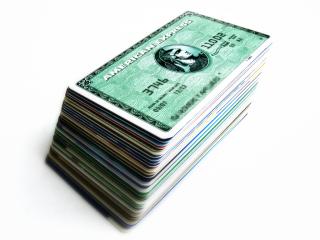Credit Cards and Chapter 13 Bankruptcy
Many people have credit card debt, and many people file chapter 13 bankruptcy. But what about when there is credit card debt in chapter 13 bankruptcy? Chapter 13 plans are repayment plans, a fact that causes a good bit of uncertainty for people considering bankruptcy as a way to get out from burdensome credit card payments. This post explains the basics of how credit cards are treated in chapter 13, and explains why many chapter 13 plans provide no payment at all to credit card lenders.
Folks familiar with bankruptcy often appreciate the ability of chapter 7 bankruptcy to eliminate credit card debts that have piled up. Chapter 13 bankruptcy can be just as effective at eliminating credit card debt, and carries other advantages that some bankruptcy debtors find beneficial.
Credit Card Collections and Payments
As with chapter 7, the bankruptcy automatic stay goes into effect upon the filing of the bankruptcy petition with the court. With the stay in place, a credit card lender can no longer attempt to collect the credit card debt. They cannot make collections calls, send collections letters, and file or proceed with a lawsuit, among other things. If the debtor performs on his or her plan and receives a discharge, the stay is replaced with a permanent discharge injunction. Collection could resume in the event of dismissal, close of the bankruptcy without a discharge, or other relief from the stay. For the most part, these negative events can be avoided by careful debtors. In short, once the bankruptcy is filed, credit card collections end if the debtor does what he or she needs to do under the bankruptcy code and chapter 13 plan.
Many bankruptcy debtors have stopped paying their credit card bills well before considering bankruptcy, choosing instead to devote their scarce funds to necessities, such as food and shelter. For others, they must decide at what point to stop making credit card payments in anticipation of bankruptcy. It would be rare situation, especially in a chapter 13, where it would be of benefit to make a credit card payment after filing bankruptcy. Whether it makes sense to stop days, weeks, or months in advance of the filing depends greatly on individual circumstances and objectives. We can evaluate your situation and provide individualized advice.
The Credit Card in the Chapter 13 Plan
The debtor proposes a chapter 13 plan, which is subject to a number of requirements and must be confirmed by the court. This plan provides a plan payment (how much the debtor is going to pay each month into chapter 13) and treatment for the creditors (what is going to be paid out to creditors over the life the plan). Credit cards are almost always general unsecured debts, which are at the back of the line for payments in bankruptcy.
After Congress enacted the 2005 bankruptcy law, the requirements for chapter 13 plans changed. In many ways, a plan that pays out nothing to credit cards and other unsecured creditors, i.e. a plan with a 0% dividend to unsecured creditors, is the new normal. The most common reasons why a plan pays unsecured creditors a dividend are the presence of disposable income and ownership of valuable assets.
Disposable Income and Credit Cards
Disposable income considerations include the requirements of statutory means testing. Disposable income is evaluated differently for above and below median income debtors, where the median gross income is determined in light of household size. For below median income debtors, the debtor's actual expenses are considered to see if he or she has disposable income to pay to unsecured creditors. It is possible, but rare, for this to be the case. For above median income debtors, means test expenses are used, which are a combination of set allowances (e.g. reasonable food and clothing allowance) and actual expenses (e.g. insurance and taxes).
If disposable income is present, the plan would provide that unsecured creditors receive a particular total sum in disbursements. Depending the quantity of debt and amount of disposable income, the plan might pay pennies on the dollar or might pay creditors in full.
Valuable Assets and Liquidation Value
In chapter 7, credit cards and other unsecured debts receive payment only if the debtor owns valuable property that the trustee can sell. Debtors are entitled to claim property exemptions, which serve as allowances to keep a certain amount of property from being sold. The liquidation test of chapter 13 requires unsecured creditors to be no worse off in chapter 13 than they would have been in chapter 7. However, instead of the selling the property as in chapter 7, the chapter 13 debtor pays income into the chapter 13 plan to pay the creditors who would have benefited from chapter 7. How much creditors are paid depends on how valuable the property is and how many claims exist. Elsewhere, we discuss the particulars of the liquidation test at length.
Other Considerations for Credit Cards in Chapter 13
Joint credit cards deserve special mention. When more than one person is liable on a credit card, the bankruptcy of one person can only eliminate that one person's liability on the debt. The other holder of the card remains liable throughout the bankruptcy process, and is in default if not making payments as required by the contract.
For debtors who wish to protect a co-obligor on a credit card account, chapter 13 bankruptcy offers some special options. Chapter 13 provides a co-debtor stay that limits collection activity against a co-obligor. Debtors then have the opportunity to propose a plan that pays the joint credit card in full, thus preventing the joint account holder from experiencing collections activity.
A Closing Caution
The vast majority of credit card holders incurred their credit card debts with the belief they would be able to pay the credit card debt, only to suffer a downturn in their financial circumstances or to experience the harsh policies of a credit card lender. This is not always the case--occasionally, people use credit cards with the intent to never pay. A lender who believes credit was obtained from them fraudulently may sue in bankruptcy court to have the debt determined to be non-dischargable. Purchases of luxury goods and receipt of cash advances immediately prior to bankruptcy have a presumption of non-dischargability.
Too Much Credit by Andres Rueda. Licensed via a Creative Commons License, original at http://www.flickr.com/photos/andresrueda/3274955487/
- Log in to post comments




